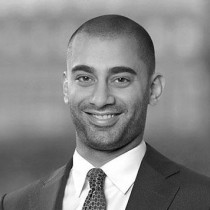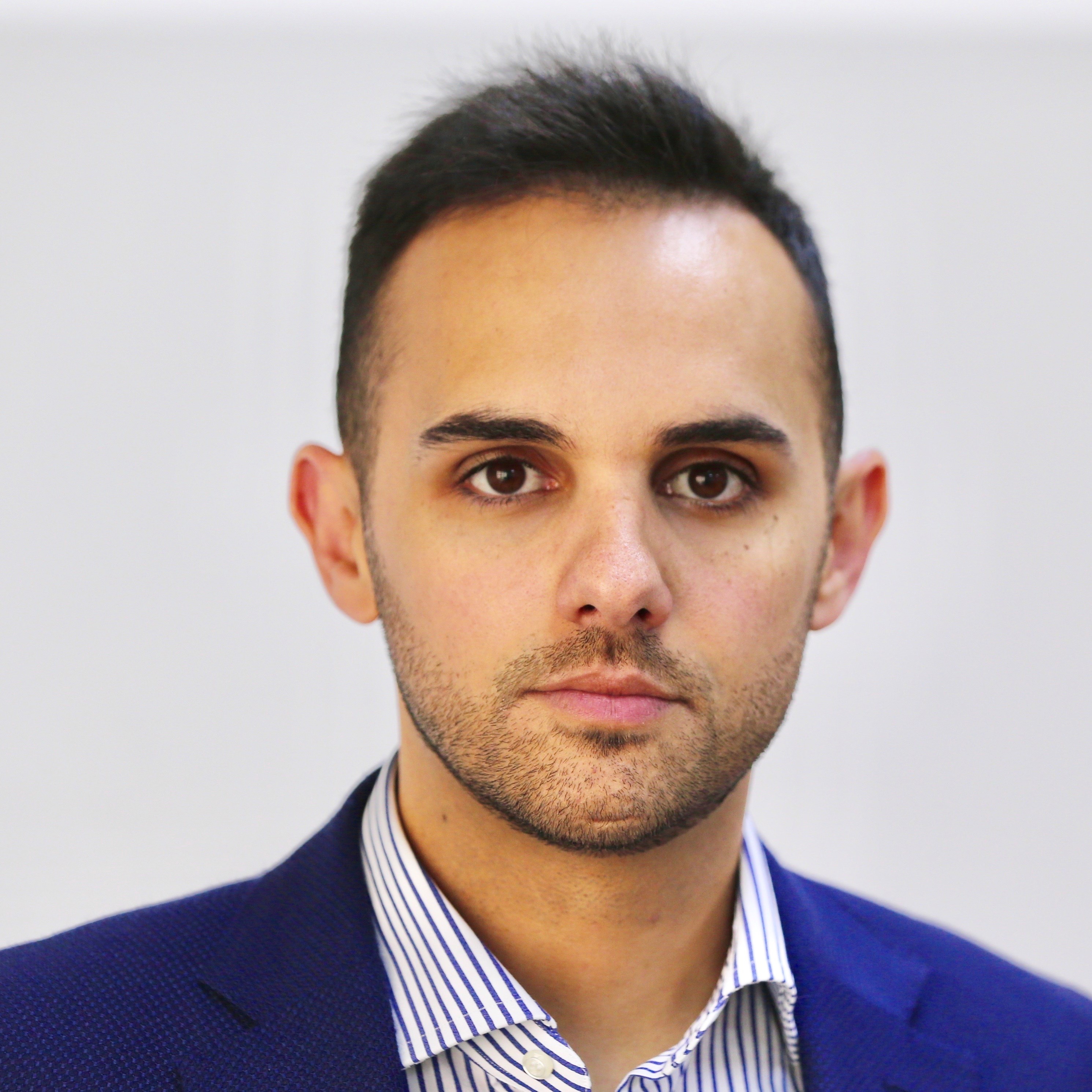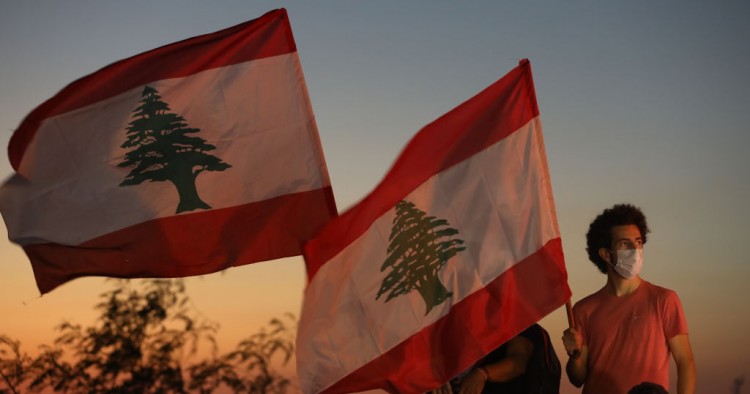A special briefing on Lebanon one year after the October uprising, featuring Anthony Elghossain, Randa Slim, Alia Moubayed, and Joseph Haboush.
Out of purgatory? Protests and the prospects of political change in Lebanon
Anthony Elghossain
Non-resident Scholar

A year ago, people took to streets and squares across Lebanon. Enraged, hopeful, and defiant, they to demanded change — regardless of their communal affiliations, social backgrounds, or walks of life.
Having already adapted to problems for decades, marked by war, occupation, and a second era of independence, people in Lebanon spent the summer of 2019 struggling through strikes, cash crunches, high(er) unemployment, product shortages, fires, and floods. After that, Lebanese leaders adopted a set of discombobulated, so-called austerity measures — including a “WhatsApp tax,” an odd lovechild of their incompetence and insensitivity — on Oct. 16, 2019. Enraged, people took to the streets the next day. Finding hope in each other, they threw another carnival of dissent. Faced with a shameless response from different leaders, they settled somewhere between defiance and determination, marching for weeks in every city, town, and village. They toppled a government. They attacked Lebanese leaders, learning the hard way that some are more sacred than others — and that sacredness tends to correspond proportionally to the power of any such leader’s partisans. They climbed out of oblivion — reminding their leaders that they existed and statespersons that stability and peace aren’t the same damn thing.
And, then, they went home.
By the holiday season, most protesters — citizens, who in their numbers and distribution made the October Revolt different from and more significant than previous protests — had left the streets to people who’ve dominated dissent over the past decade: reformists and revolutionaries, including serial activists, dedicated civil society organizers, academics, young professionals, and/or some of Lebanon’s youth.
As people in Lebanon have slid deeper into the abyss, reformists and revolutionaries have not realized their demands. They’ve not achieved their envisioned change, inspired citizens to join them, or influenced practical politics. And they’ve not — not actually, not adequately — identified, assessed, and exploited opportunities to integrate immediate action into broad-based, long-range campaigns for political power, institutional leverage, and sociocultural influence.
They have not yet succeeded. And, yet, not all of them have failed.
Performance and prospects differ, depending on people’s visions, strategies, and tactics — to say nothing of motives and means, commitment and diligence, and the like. Some people have failed. Period. (Indeed, some have failed so spectacularly as to drive undecided Lebanese back into the arms of an established elite that has only heaped more humiliation — the Beirut blast, with its more than 200 dead and 6,000 wounded, being Exhibit A — on them during the past year.) Others have quit, entering the exiles within and outside of Lebanon and making the personal and professional compromises they once — with neither empathy nor maturity — blasted others, such as their own parents, for making. Others still have persisted, without understanding or acknowledging that they’ve already lost the sort of struggle they’ve chosen. And some have, somewhat sadly and unimaginatively, tried to have others do for them what they can’t or won’t do for themselves.
Even so, some reformists and revolutionaries have made progress — understanding, and appreciating fully, that theirs is fundamentally a struggle for political change. They’ve developed new organizations and initiatives, putting in place teams and processes for the future. They’ve broadened their base(s), interacting with different segments of society and establishing themselves in — or connecting with likeminded Lebanese from — cities, towns, and villages across the country. And, regardless of their hopes, ambitions, and disappointments, some of them are doing what is necessary today so that others can do what is sufficient tomorrow.
In a sense, the Lebanese are in a purgatory of their own making — a place where change within the system occurs, seemingly to make deeper change to or of the order all the more difficult. Lebanon is the land of partial freedom, ruled by men who are neither democrats nor tyrants, neither patriots nor quislings, neither friends nor foes. (Just today, once and future premier Saad Hariri returned to office on the backs of factions — from the transactional Amal Movement to the thuggish Syrian Social Nationalist Party — who’ve violently humiliated him, and indeed large segments of society in Lebanon, time and time again.) Its people work in an economy colored in shades of gray; live in a society in which everything is somehow sacred, profane, obscene, and negotiable; and seek, sometimes desperately, to change or leave a land they can never abandon in their hearts and minds. Not at peace, not at war, leaders and their factions — vicious minorities, always shaping the state and society as most people carry on with their lives — fight in the space between, moving the machinery that animates illusory choice and mobilizes people on their behalf.
The Lebanese who desire change must learn from the leaders they’re struggling against. They must operate in the spaces between, understanding that their success is neither inevitable nor impossible. Becoming comfortable with uncertainty, compromise, piecemeal progress, and imperfect practice of politics, they must now do what they would have needed to do had they succeeded, anyway: reimagine their campaign for change as a long-range, ever-evolving initiative, through which they may work to forge the future they desire without losing themselves — or forgetting their goals, or compromising so much on means that they render the ends irrelevant — along their long path out of purgatory.
Hezbollah’s changing cost calculus
Randa Slim
Senior Fellow, Director of Conflict Resolution and Track II Dialogues program

One year on from the October uprising that toppled the government led by Saad Hariri and it is back to the future for Hezbollah and Speaker of Parliament Nabih Berri. Last year, they did not want Mr. Hariri to resign and worked hard to convince him not to. Even after he eventually did on Oct. 29, 2019, their preferred course of action was to renominate him for the job. Once Mr. Hariri insisted on forming a new cabinet without the participation of Gebran Bassil, who had increasingly become the protesters’ bete noire, Hezbollah decided that the cost of abandoning their ally was too high. Hezbollah has few allies, especially in the Christian community, and the leader of the largest Christian bloc in Parliament is not one who can be abandoned during times of domestic turmoil in favor of Mr. Hariri. At the time, they also wanted to teach Mr. Hariri a lesson: He is not indispensable.
For Hezbollah, Hassan Diab was a convenient candidate. A technocrat and a non-political figure, he was no threat to Mr. Hariri’s political base and in their calculations at the time, he met the protesters’ demands for a technocratic figure to lead the cabinet. For Hezbollah, Dr. Diab would fill the post on an interim basis until Mr. Hariri found it politically expedient to return to office.
One year later, after a blast that leveled large parts of Beirut, Mr. Hariri concluded it was time for him to return, but he could not position himself for the job of prime minister immediately after the resignation of the Diab government. He did not want to publicly oppose the French president’s political initiative, which called for the formation of a “mission government” headed by and involving non-politically affiliated technocrats that would focus primarily on fixing Lebanon’s economic and fiscal woes and lead the reconstruction effort in Beirut.
Not able to occupy the post himself, Mr. Hariri went for the next best thing: choose someone who could fill the position on an interim basis until it is politically feasible for him to take over. He tapped Mustapha Adib for the job. Like his predecessor, Dr. Adib was a convenient choice who represented no threat to Mr. Hariri’s political base and met the criteria laid out in the French president’s initiative. Once the French initiative met its demise, ending Dr. Adib’s chances of forming a government, the ground was paved for Mr. Hariri’s return to office with the support of Hezbollah and Mr. Berri.
While the bad relationship between Mr. Hariri and Mr. Bassil remains a sticking point for Hezbollah and they are hard at work to bridge the divide, times have changed and Mr. Bassil no longer has veto power to block Mr. Hariri’s return to government. Lebanon’s dire economic trajectory, Mr. Bassil’s sinking political fortunes among Lebanese Christians, and the changing mood inside key European countries that to-date have refused to align EU policies with the U.S.’s on the issue of Hezbollah’s terrorist designation, are affecting Hezbollah’s cost calculus. It may no longer make sense to block the formation of a government headed by Mr. Hariri to please an ally like Mr. Bassil, especially if the chances of that ally ever ascending to the presidency have now become negligible. Mr. Bassil has become a liability for his own political party, let alone for his allies, Hezbollah included. Moreover, Hezbollah no longer feels the need to mollify the protesters, who remain as opposed to Hariri’s nomination now as they were a year ago.
Restructuring and rethinking Lebanon’s economy
Alia Moubayed
Economist specialized in the MENA region

Decades of economic policy mismanagement and entrenched state capture by Lebanon’s kleptocracy led the Lebanese economy and society to ruins. A combination of debt, currency, and banking crises that imploded in October 2019 has now been compounded by the spread of COVID-19 and the fallout from the deadly Aug. 4 blast at Beirut port, leaving the country facing a dangerous socio-political crisis, the worst since the civil war. The economy is contracting by 25 percent in 2020 amid spiraling hyperinflation, throwing millions deeper into poverty as they lose their jobs and see their real incomes rapidly erode. Despite the misery befalling the Lebanese, the same kleptocracy thwarted attempts aimed at devising an economic and financial rescue plan and at engaging with the International Monetary Fund (IMF) for an orderly exit from the crisis. They opposed an equitable burden sharing of the adjustment and a fair distribution of the losses in the banking system, forcing instead a generalized impoverishment of the population.
A renewed effort should be made to forge ahead with a comprehensive macro-fiscal stabilization, recovery, and social cohesion plan and to put the economy onto a sustainable and high-quality growth path. The plan needs to restructure debt to reduce it to 60-70 percent of GDP, to restructure and recapitalize a right-sized banking sector, to ensure that fiscal adjustment allows for an effective social protection system, and to implement wide-ranging structural and governance-related reforms aimed at improving the business environment, strengthening accountability, and rebuilding state institutions.
To do that, the new government should assume leadership and build local ownership and broad-based support for such a plan first and engage with the IMF and the rest of the international community accordingly. The help of the latter is necessary, not only to provide the needed financing, but also to anchor the reform path within a credible framework in order to regain the confidence of Lebanese citizens and of the international financial markets. More importantly, engaging with the IMF could bring the Lebanese to rethink and restructure a defunct economic model and build an equitable, inclusive social contract.
The path toward an agreement with the IMF, however, is fraught with difficulties and could face serious implementation risks in the future, as resistance to deep structural reforms and weakening of institutions will persist. Accordingly, the responsibility for rescuing the economy in the next phase cannot be entrusted to those who brought the country to its demise. Instead, genuine unwavering willingness to reform and credible technical ability to deliver are a must.
Alia Moubayed is an economist specialized in the MENA region.
@aliamoub
A rare bright spark: Lebanon-Israel maritime border negotiations
Joseph Haboush
Washington correspondent for Al-Arabiya English

One of the few positive developments over the last year or so for Lebanon, and the region more broadly, has been the start of maritime border negotiations between Beirut and Tel Aviv.
There has been no shortage of conspiracies and arguments about the timing of this move; however, getting the two sides to sit at the table for talks on such a controversial issue is nothing short of significant.
Where the talks head, the pace at which they proceed, and how successful they will be all remain to be seen. But perhaps the most noteworthy breakthrough is the Iran-backed Hezbollah’s softened stance on the issue. Ultimately, these talks would not have been able to start without a green light from the group, which is bogged down in Syria, Iraq, and Yemen, and faces a growing backlash at home from its own support base.
The Lebanese-Israeli negotiations would also not have started without U.S. mediation and diplomacy. The Trump administration will continue to tout this as another diplomatic achievement toward peace in the Middle East, although the talks are indirect, carried out via U.S. and U.N. officials.
As for the actual talks, Israel squeezed in non-military figures and was met with Lebanon doing the same. This drew a public rebuke from Hezbollah and its Shi’a allies in the Amal Movement. But the Lebanese president pressed on and did not fully comply with Hezbollah’s demands that the delegation only be made up of military officials. President Michel Aoun did remove a Foreign Ministry diplomat after the backlash, however.
The second round of talks is slated for Oct. 28.
And although the prospects for such talks leading to normalization between the two archenemies — in line with the trend among Arab and Gulf states — are slim to none, any agreement would require both sides to defuse tensions further.
A greater likelihood of calm and stability off Lebanon and Israel's coasts will only help to draw interest from international companies keen on exploring for potential offshore oil and gas reserves.
For all the factors that continue to draw Lebanon closer to becoming a failed state, this advance is a win-win for all sides involved: Lebanon, Israel, and the United States.
Joseph Haboush is the Washington correspondent for Al-Arabiya English.
@jhaboush
Washington and Beirut: The US-Lebanon military relationship
Joseph Haboush
Washington correspondent for Al-Arabiya English

With members of the Lebanese Armed Forces (LAF) heading the delegation for maritime border talks, their leadership will be another point of strength for backers on Capitol Hill in Washington. There has been a sharp divide between U.S. officials and members of Congress over the issue of U.S. taxpayer support for the LAF and whether it should be continued or scaled back.
Since the Oct. 17 protests last year, the LAF has been stuck between a rock and a hard place. At times, it has been exposed and used excessive force against protesters, while other instances have made clear the need for a strong state institution.
Over the past year the LAF has also showed its ability to protect Lebanese civilians from attacks by Hezbollah supporters, emboldened by the group’s massive arsenal of weaponry. Nevertheless, the LAF has more work to do, but a sustainable relationship between the Pentagon and Lebanese army is vital to any future progress.
And as progress is made between Lebanon and Israel vis-à-vis maritime border talks, this could create more trust to better equip and arm the LAF to continue its fight against terrorism and sleeper cells across the country that could pop up at any time.
As the trajectory of Lebanon’s economic and financial situation continues to worsen, the presence of a robust state actor like the LAF is a must.
Russia, China, and Iran will not provide the necessary weaponry and training for free, as is the case with U.S. military aid. And were any of those three countries to try to step into a potential vacuum left by the U.S., the threat of rogue state and non-state actors using Beirut as a launchpad for attacks against Arab and Israeli targets might only increase.
Hezbollah’s raison d’être will continue to be undermined as progress is made on the maritime talks and, potentially, land border demarcations, and its popularity will only decline as it gets further mired in the typical mudslinging of Lebanese politics.
In the meantime, ensuring Lebanon has a strong state actor like the LAF will remain vitally important because history has proved that Iran’s proxies and militias thrive in chaotic environments.
Joseph Haboush is the Washington correspondent for Al-Arabiya English.
@jhaboush
Photo by Marwan Tahtah/Getty Images
The Middle East Institute (MEI) is an independent, non-partisan, non-for-profit, educational organization. It does not engage in advocacy and its scholars’ opinions are their own. MEI welcomes financial donations, but retains sole editorial control over its work and its publications reflect only the authors’ views. For a listing of MEI donors, please click here.













